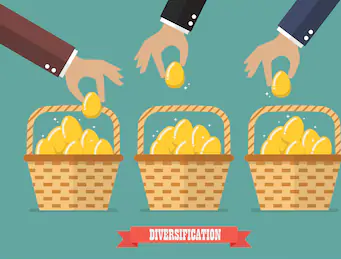We have already seen the “What, Why and How” of Investments. We have also seen the various types of Financial investment avenues available for you in India. After going through all the types of investments it is quite natural that some people may be a little confused as to the correct choice. Coming all the way till now I am sure that many are still not certain as to which investment avenue is to be selected. we would like to state that this is purely an individual choice. But the choice should be correct as making the wrong investment choice can lead to financial losses, which is something that no one wants. Hence we have to exercise caution before the decision is made.
One should always consider the following factors to decide where to invest his hard earned money.
1.Investment Goal.

It is always important to think about your personal investment goals, which is the reason for your investment choices. An investor who is looking to generate a second income through investing and an investor who wants to amass a large enough fortune for retirement, will make much different investment choices.
Goals play an important role in deciding the type of investments. One may have a goal that can be achieved within a short period of time say 3-4 years. This could be making up the amount for the down payment for acquiring a flat of his own or constructing his own house or buying his dream car. This is a short term goal. Whereas in case of a newly employed person who is planning for his goal of one crore retirement corpus for acquiring his dream holiday home or the father of a new born child investing his savings for meeting the MBBS education expenses of the child. Both these goals gives time period of more than 15-20years.These are long-term goals.
Goals play an important role in deciding the type of investments. One may have a goal that can be achieved within a short period of time say 3-4 years. This could be making up the amount for the down payment for acquiring a flat of his own or constructing his own house or buying his dream ca. This is a short term goal.

Whereas in case of a newly employed person who is planning for his goal of one crore retirement corpus for acquiring his dream holiday home or the father of a new born child investing his savings for meeting the MBBS education expenses of the child. Both these goals gives time period of more than 15-20years.These are long-term goals.

For a short-term goal like down payment of a house , one should opt for a safer investment of a bank fixed deposit /recurring deposit or SIP in a Debt/balanced Mutual Fund where his capital is assured and can expect for a reasonable return.. Whereas for achieving long term goals one should make use of the return-generating and compounding potential of equities.
Then we have to see the negotiability of the goal. Goals can be negotiable or non-negotiable, that is whether it can be postponed a little or not. For non-negotiable goals like children’s education or down payment for a house, guaranteed-return investments like fixed income securities where capital is assured with reasonable return would be a good choice. But if the goal is negotiable, like purchasing one’s dream car which can be pushed back by a few months, then investing in equity mutual funds can be beneficial. Investments in equity mutual funds or stocks are subject to market fluctuations and if at the end of your time period if the market conditions are not favourable, you may have to wait for few more months to optimise the returns. On the other hand if the conditions are favourable the investments will do really well and then you can even meet the goal before time.
Whatever goal oriented investment plan you select, it must be chosen with the main goal or purpose of any investment in mind ,that is generating income or growth but should not be devoid of safety.
2.Age of the Investor.

The age of the investor also play an important role in the selection of the investment tool.
It is true that younger investors have fewer responsibilities when they are single and have a much longer time period in front of them. That means they have high potential to save as the expenses are less and also they can invest in investment vehicles with a long-term view. They can also keep increasing their investment amount as their income will keep increasing due to promotions and better earnings due to experience. So equity-oriented investments like stocks or equity mutual funds would be a better option for young investors as they can augment their investments periodically and can also take the benefit of higher returns and effect of compounding due to the long period of time available before them. We have seen that higher returns also leads to higher risk. But the young investors can take high risk, because of the time available before them for making amendments and fewer dependants on them.

But as you grow older towards middle age your investment preferences also will have to change. Once you are married and have the responsibility of a family you cant be carefree and take up any type of investment that promises good return. You have to look at the safety of the investment. Also has to ensure that the invested amount will be available at the end of the predetermined time period for meeting the investment goal. Now the goal may be purchase of house or Child’s education. Here one has to select an investment where the capital is assured along with a reasonable return for the major part of his investment and a lesser portion can be earmarked for Equity related investments like stocks. So middle aged investor has to be little conservative.

If you are above 50, before you create an investment plan, you should make it doubly sure that you have a retirement plan in place before taking up any other investments. Once you have a pension scheme in place which will take care of your retirement, you can think of making other investments including Equity/stocks. If your pension scheme is not inflation protected you should plan an investment which will give additional income to take care of the inflation. For deciding upon the specific type of investment you should prepare a projection of your future sources of income and expenses, including any lumpsum amount to be received on retirement and also any lumpsum payments to be done. The suitable investment options are bank deposits, Senior Citizens Deposit scheme, National Pension System, Debt Mutual Funds etc. which offer guaranteed return, and very small portion in Equity related investments.
So according to the age profile the investment type also changes. Here we would like to mention the old thumb rule of investment given below. Many investment Gurus use this formula.
“Your investments in Stocks/Equities should be 100 – Your age. The remaining should be in Fixed income securities.”
That is to say if your age is 25 years you may invest 75 % of your investment amount in Stocks/Equity assets and 25 % in bonds or fixed income securities. If your age is 75 years you may invest only up to 25% of your investible surplus in Equities and at least 75 % should be in Fixed income securities and other guaranteed return schemes.

This appears to be a reasonable investment guidance as we have already seen that as age increases equity oriented investments should be curtailed and safe and guaranteed return investments should be increased.
But we would like to suggest one change on above. Out of the 25 % meant to be invested in bonds or equities 5 % be kept in cash equivalent securities (like bank deposits) which is very liquid and can be encashed at any point of time without any delay. This amount will be of great help to meet emergencies. The ideal goal is to always keep a few months expenses around in case something happens and invest the rest.
3.Personal and Risk Profile

Before one venture out to make investment, another important thing to think about is his own personal profile like his financial capacity. Though one’s earnings may be high, it does not mean he/she may be able to make big investment commitments. If dependents on him are more, major portion of earnings will go towards expenses. If his financial dependence is more, major portion of earnings will go towards loan repayments. One should have surplus funds to start investments. Invest as much as you can while reducing the chance that you’ll need to sell your investments to cover basic expenses.
We have seen in the Age profile that young investors are prone to take up more risky investments with lot of time at their disposal. But at the same time if he also has the responsibility to take care of his family he may not be able to take equity-related risks.
In the same way risk taking capacity of a person also play an important role. An young investor need not always be a high risk taker because they may have a low risk tolerance. Some youngsters may not like to take the tension of managing a high risk investment. They may like to be sure of the safety of their investment. Such youngsters may not go for equity related investments, but prefer some fixed income securities. An investment such as a bank fixed deposit offers a very low say 7 % interest, but guaranteed rate of return. Such investments are appropriate for individuals with a very low risk tolerance as discussed above , who are more concerned with protecting their investment capital than doubling or tripling it.
Similarly, someone older (above the age of 50 years) with no dependents and a steady source of income and assured pension may choose to invest in equities to earn higher returns say 15 % or more annually. But this investment carry a much greater degree of risk. There is also no guaranteed return with equity investing. So the personal preferences and risk taking mentality of the individual play an important role.
Because of the correlation between risk and potential return, investors need to carefully consider their risk tolerance when selecting investments – how much risk you’re willing to accept in order to realise higher Return. Investment items as per Risk perceived is given below
| Risk | Zero to Low Risk | Medium risk | High Risk |
|---|---|---|---|
| Investment Type | Govt. Bonds PPF & EPF NSCs Senior Citizens Deposits Sukanya Samriddhi Yojana Bank Fixed Deposits Insurance Policies | Bonds Debentures Debt Mutual funds Balanced MFs National Pension System | Equity shares Equity MFs Company Fixed Deposits. Equity derivatives (very high risk) |
| Return | Low Return | Medium Return | High Return |
4.Diversify your investments.

Do not concentrate your investments in one investment item. Allocate the total investment among various types of investments. This way you can mitigate risk to certain extent. You have heard the saying “ Do not keep all your eggs in one basket”. If you are investing in Stocks don’t put all your money in one stock or in one sector. Split it among different stocks and different sectors. This help in spreading the risk which is a risk management technique. Mutual Funds work on this principle. Diversification is your investing success code for riding the market. Invest in many different things so no single failure can ever shut you down.
5.Invest early, Invest regularly

The habit of early investing even small amounts of money is definitely a habit worth cultivating, a habit that will pay off handsomely for you.Starting your investments early can make the time period of investment very long and helps you to take the benefit of compounding. The compounding effect really plays a dramatic effect on long term investments.
Very few people can perfectly time the market for making investments so it is always better to cultivate the habit of regular investments. Regular investments help us in averaging the cost of investment. Contribute every month to your investments and it won’t matter if you buy at the peak or bottom of the market. Many of us fail to realize how fast we can create a sizeable amount simply by making modest but regular investments.
6. Do your Research and Invest in what you believe in

Congratulations ! to you for being on this site. You are on the right track and doing your research on investments. Before making any investment do your own research. Don’t be carried away by WhatsApp tips and rumours. Even if your friend is recommending an investment confirm the accuracy by yourself, because it is your hard earned money. Even if you are taking the advise of an Investment Advisor before finalising your investment do your own research. If you do not know or understand what you’re buying, don’t buy it. Even if you do understand it, only invest in something that you personally believe in.
Maybe you love Maggie Noodles then try to understand the company making it and its competitors. But if you don’t understand the Noodle making business you either figure out how it works or don’t invest in it.
Try to understand through your research whether the noodle business is profitable. Ask the question whether Nestle, the makers of Maggie noodle, are innovators or just people milking an existing product line and try to find the answer.
7. Invest in Educational Aids on investing.

Investing is a skill –it is an art and at the same time science. It is actually a practice you embark on to succeed in the game of making money. As with any other skill, from dancing to singing to chess, there are lots of things to learn and practice and it takes time to develop your skill as an investor.
The field of investing is very wide one, and there are infinite number of things to learn about investments. You can’t learn everything there is to know about investing in one day. But you have made a start today by visiting this site. Now make it a point to set yourself a course of self-study to become knowledgeable in the field of finance and investing. There are numerous books, periodicals you can read to enhance your knowledge and understanding if investments.
But keep in mind that most successful investors will tell you that they are continually learning, continually sharpening and expanding their skills at making money through investments.
Investment mantras
Before concluding let us list out 7 investment mantras which any investor should always remember.
To read more click HERE
